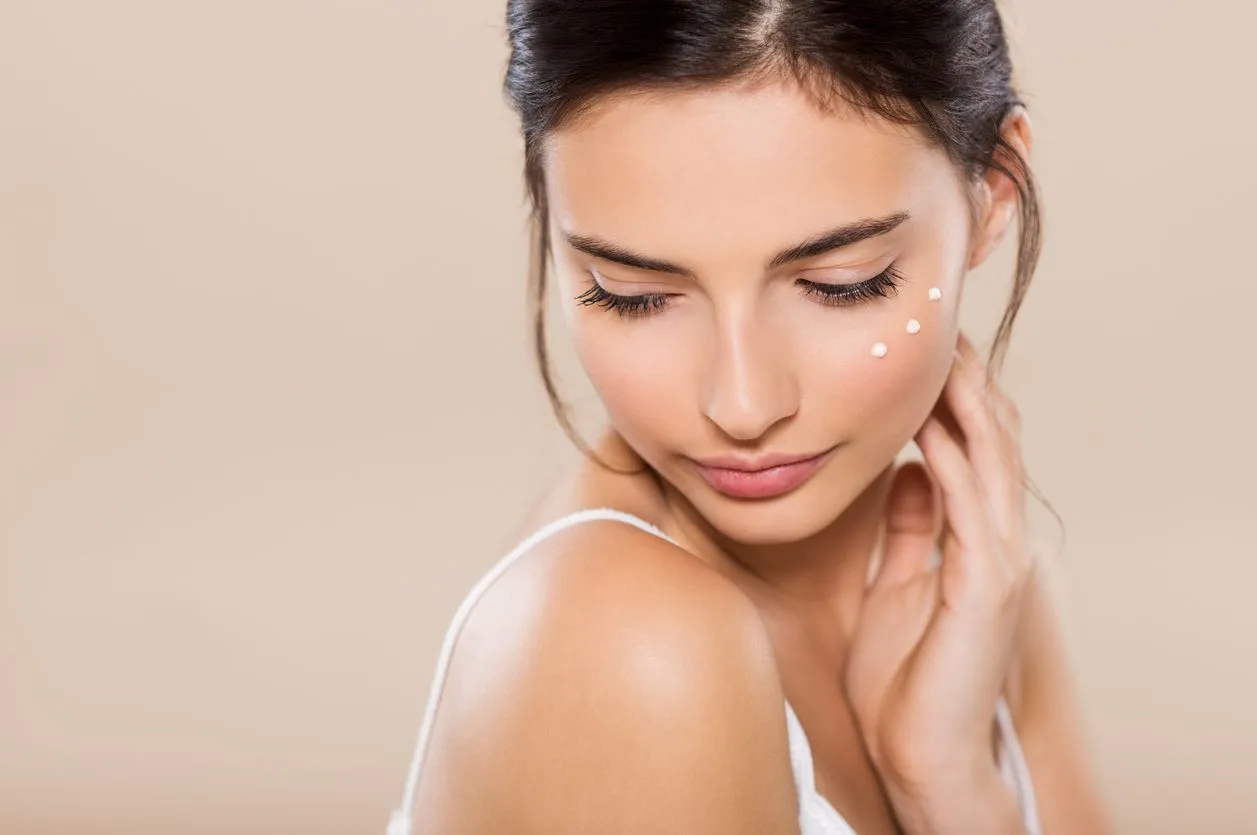What Does it Mean to Moisturize Skin?
“Moisturizing” is the process of trapping and locking in moisture in order to strengthen your skin’s natural protective barrier. This will prevent any water loss and keep your skin soft and smooth.
What is Difference Between Moisturizing and Hydrating?
Have you ever had the sensation that your skin is begging you to quench its thirst? Hydrators and moisturizers are for this purpose. They both fight dryness and dehydration to give you youthful, supple skin.
–If you have dry skin, it means that your skin is deficient in oil and needs to be moisturized.
–If you have dehydrated skin, it lacks water and requires hydration.
Hydration makes our skin feel soft, but it won’t stay soft if there’s no oil to keep the moisture in. If hydration is lost, the skin becomes dry and flaky. Putting oil on dehydrated skin, on the other hand, may visibly smooth it, but it will still lack the soft, bouncy feeling that comes from hydration.
Why Moisturizing Your Skin Is Important?
Moisturizing Reduces Skin Problems – Moisturizing on a daily basis can reduce the likelihood of developing extreme dryness or oiliness. Both extremes are harmful to the skin and contribute to common skin conditions such as acne. Conceals Other Skin Blemishes – Using a daily moisturizer helps to conceal blemishes on the skin.
Does Moisturizing Make Skin Better?
Moisturizing reduces the chances of skin problems.
Using the right moisturizer for your skin type can help keep its balance. Many common skin problems, such as acne, begin to appear when the skin becomes too dry or too oily.
What Happens When You Don’t Moisturize Your Skin?
Dull & Dry Skin
This may seem obvious, but if you don’t moisturize, you will dry out your skin, which will be exacerbated if it’s winter and cold outside, or if the humidity is extremely low. Your skin will flake and appear dry if you do not use moisturizer.
How Do You Know If Your Skin Needs Moisture?
7 Signs Clearly Show, You Aren’t Moisturizing Enough
- You Aren’t Moisturizing on Damp Skin.
- You Have a Dull Complexion.
- Your Makeup Looks Cracked.
- Your Skin Feels Tight.
- You Suffer from Acne.
- You Have Dark Spots or Redness.
- Your Skin Becomes Irritated Outdoors.
How to Moisturize Your Skin
Ever-growing array of products to moisturize your skin increasing ways to treat dry skin
Dry skin occurs when the skin does not retain enough moisture. This can be caused by excessive bathing, the use of harsh soaps, aging, or certain medical conditions. It can also be caused by cold, dry winter air in colder climates.
However, you don’t have to accept rough, flaking skin as a foregone consequence of aging or the climate; there are a number of ways to treat dry skin. Moisturizers are at the top of the list. “Think of moisturizers as putting a barrier between your skin and the cold, dry air,” says Dr. Kenneth Arndt, professor of dermatology at Harvard Medical School. Dr. Arndt is the faculty editor for the Harvard Medical School Special Health Report Skin Care and Repair.
The Ingredients That Can Moisturize Your Skin
Moisturizers, which rehydrate the top layer of skin cells and seal in moisture, are one of the most effective treatments for dry skin. They are made up of three types of ingredients:
- These substances aid in the attraction of moisture. Ceramides (pronounced ser-A-mids), glycerin, sorbitol, hyaluronic acid, and lecithin are among them.
- These ingredients, which include petrolatum (petroleum jelly), silicone, lanolin, and a variety of oils, aid in the sealing of moisture within the skin.
- To keep the two from separating, these products contain oil, water, and an emulsifier. They are less heavy and less difficult to apply than petrolatum or oils. Many commercial moisturizers contain linoleic, linolenic, and lauric acids, which are both emollients and humectants.
In general, the thicker and greasier a product is, the better it moisturizes your skin. Petroleum jelly and its vegetable-based alternatives, as well as moisturizing oils, including vegetable oils, are among the most effective and least expensive. Because they contain no water, they should be applied while the skin is still damp from bathing to seal in moisture.
Water and oil are present in varying proportions in lotions designed to moisturize your skin. They typically contain both humectants and emollients and can be applied to the skin at any time of day.
What Else Can You Do to Moisturize Your Skin?
Moisturizers are the first, but not only, line of defense against dry skin. It may also be beneficial to do the following.:
- Use a humidifier in the winter. Set it to around 60%, a level that should be sufficient to moisturize your skin.
- Keep showers short. Take one 5- to 10-minute bath or shower per day. Bathing more than that may strip away much of the skin’s oily layer, causing it to lose moisture. Use lukewarm water instead of hot water, which can remove natural oils.
- Minimize your use of soaps. Consider using soap-free cleaners. Avoid deodorant soaps, perfumed soaps, and alcohol-based products that can strip away natural oils. Avoid fabric softeners and use fragrance-free laundry detergents.
- Be gentle to your skin. Avoid using bath sponges, scrub brushes, or rough washcloths. For the same reason, when toweling dry, pat or blot the skin rather than rubbing it.
- Don’t scratch. A moisturizer can usually alleviate the itch. A cold pack or compress can also be used to relieve itchy spots.
- Prune your wardrobe. If you discover that clothing made of wool, acrylics, or other fabrics irritates your skin, donate them.
What Is The Best Way to Moisturize Your Skin?
Dermatologists recommend the following treatments to help heal dry skin and prevent it from returning.
— Stop baths and showers from worsening dry skin. When the humidity drops or your skin feels dry, be sure to:
- Close the bathroom door.
- Use warm rather than hot water.
- Limit your time in the shower or bath to 5 or 10 minutes.
- Wash with a gentle, fragrance-free cleanser.
- Apply enough cleanser to remove dirt and oil, avoid using so much that you see a thick lather.
- Blot your skin gently dry with a towel.
- Slather on the moisturizer immediately after drying your skin.
Baths and showers can worsen dry skin.
— Apply moisturizer immediately after washing. Moisturizers (ointments, creams, and lotions) work by trapping existing moisture in your skin. To trap this much-needed moisture, apply a moisturizer within a few minutes of showering:
- Drying off after a shower or bath
- Washing your face or hands
— Use an ointment or cream rather than a lotion. Lotions are less effective and more irritating than ointments and creams. Look for a cream or ointment that contains one or more of the ingredients listed below:
- Jojoba oil
- Dimethicone
- Glycerin
- Hyaluronic acid
- Lactic acid Lanolin
- Mineral oil
- Petrolatum
- Shea butter
— Wear lip balm. Choose a lip balm that feels comfortable on your lips. If you notice that your lips sting or tingle after applying the lip balm, try a different one.
— Use only gentle, fragrance-free skin care products. Some skin care products, such as deodorant soaps, are too drying and irritating for dry, sensitive skin. Dermatologists recommend using fragrance-free products.
— Wear gloves. Our hands are frequently the first place where we notice dry skin. Putting on gloves before you work can help to reduce dry, raw skin:
- Go outdoors in winter.
- Perform tasks that require you to get your hands wet.
- Get chemicals, greases, and other substances on your hands.
— Choose non-irritating clothes and laundry detergent. Even clothes and laundry detergent can be irritating when our skin is dry and raw. In order to avoid this:
- Wear cotton or silk under your clothing made of wool or another material that feels rough.
- Use laundry detergent labeled “hypoallergenic.”
— Stay warm without cozying up to a fireplace or other heat source. Sitting in front of an open flame or other heat source can dry your skin.
— Add moisture to the air. Plug in a humidifier. If you can, check your home heating system to find out if you have a humidifier on the system — and whether it’s working.

How Can I Hydrate My Skin without Moisturizer? How to Naturally Hydrate/Moisturize My Skin?
6 Natural Alternatives to Face & Body Lotion
- Coconut Oil: This is a well-known, inexpensive alternative that can be found at your local grocery store.
- Olive Oil: Did you know it can also be used as a beauty product? Olive oil contains vitamin E, which acts as a skin moisturizer. It also stimulates collagen production, which helps to reduce scarring while keeping your skin looking young.
- Almond Oil: Almond oil contains vitamins A, D, and E, which nourish your skin. A few drops under the eyes can help reduce puffiness. Because almond oil penetrates multiple layers of your skin, it provides deeper moisture than coconut oil.
- Shea Butter: This butter is made from the nut of the karite nut tree, also known as the shea tree. Shea butter is known for promoting cell regeneration, which aids in wound healing and the appearance of younger skin. It is a natural fat high in antioxidants and fatty acids, as well as vitamins A, E, F, and K.
- Cocoa Butter: If you have dry elbows, knees, and feet, cocoa butter is an excellent alternative. Cocoa butter is a moisturizing butter derived from the fat in cocoa beans. It quickly absorbs into your skin, leaving it soft and smelling wonderful. Cocoa butter helps scars fade and is suitable for people with extremely sensitive skin.
- Aloe Vera Gel: Do you have a sunburn? Aloe vera gel is a natural anti-inflammatory derived from the aloe vera plant that is well known for soothing sunburned skin. Aloe vera gel aids in the healing of blemished or irritated skin, as well as the reduction of stretch marks and wrinkles. It reduces pigmentation, brightens your skin, fights aging, and can even be used on your hair! When shopping for Aloe Vera Gel, make sure it contains no additives; otherwise, it will be no better than regular lotion.
Our Spa’s Natural Treatments
Regarding the topic “Your Skin Needs Moisturizing!” there are excellent skin care solutions for skin’s requirements like moisturization or asisting dry skin available here.
The Mediterranean-Beauty Day Spa will greet you with a complimentary consultation and skin analysis system. Following the identification of your condition, you will be served with the best quality organic services suitable for your face skin. Some cases, however, require medical or dermatologist attention and are not our part of the role. Don’t you want fresh and aging-proof skin like Goddess with safe treatments?
*We Provide Amazing Natural Facial Treatments*
To know us better, kindly visit: Spa Columbus Ohio Organic Type
693 1/2 High Street, Suite A,
Worthington, OH 43085

